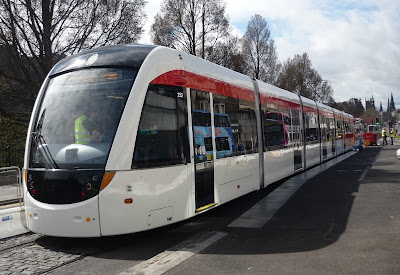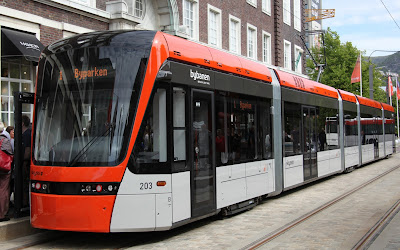However, there is a small possibility I may have inadvertently misled you when, during a recent rant about the disastrous construction of the new Edinburgh tram "system"...
... I may have given the impression that the CAF-built Edinburgh trams which were sitting idle in storage (no prospect of them being used for at least a couple of years) may soon go to Croydon, to help expand that system.
In fact, the contract to build half a dozen new trams for Croydon was awarded to Stadler way back in August.
Croydon currently uses Bombardier equipment, and the new Stadler trams will be both larger and air-conditioned (hurrah!). Here's a similar design built for Bergen:
Stadler is a relatively small Swiss-based manufacturer and this is the first order they have secured in the UK. I think it's fascinating: for years we've been told that UK manufacturing industry can't compete with low-cost centres elsewhere which is why we've let most of it close down, and here are the Swiss selling manufactured goods back to us.
Stadler specialises in multiple units and trams (including diesel multiple units, for which there is zero market in their home country since Swiss railways are 100% electrified). They are growing their market share against the ferocious likes of Bombardier, Siemens and Alstom.
I've actually featured one of their products before -- a delightful design of electric shunting locomotive, the Ee922:
But this phenomenon -- the niche manufacturer succeeding despite a breath-takingly high cost base -- is not just confined to Stadler. The German specialist locomotive manufacturer Vossloh has also had some success, including selling a fleet of diesel "Thunderbird" (or rescue) locomotives to Eurotunnel, and they've just introduced a new lightweight diesel design:
All of which makes you wonder if there isn't some other reason why Britain seems utterly unable to sustain a broadly-based manufacturing industrial sector.













No comments:
Post a Comment